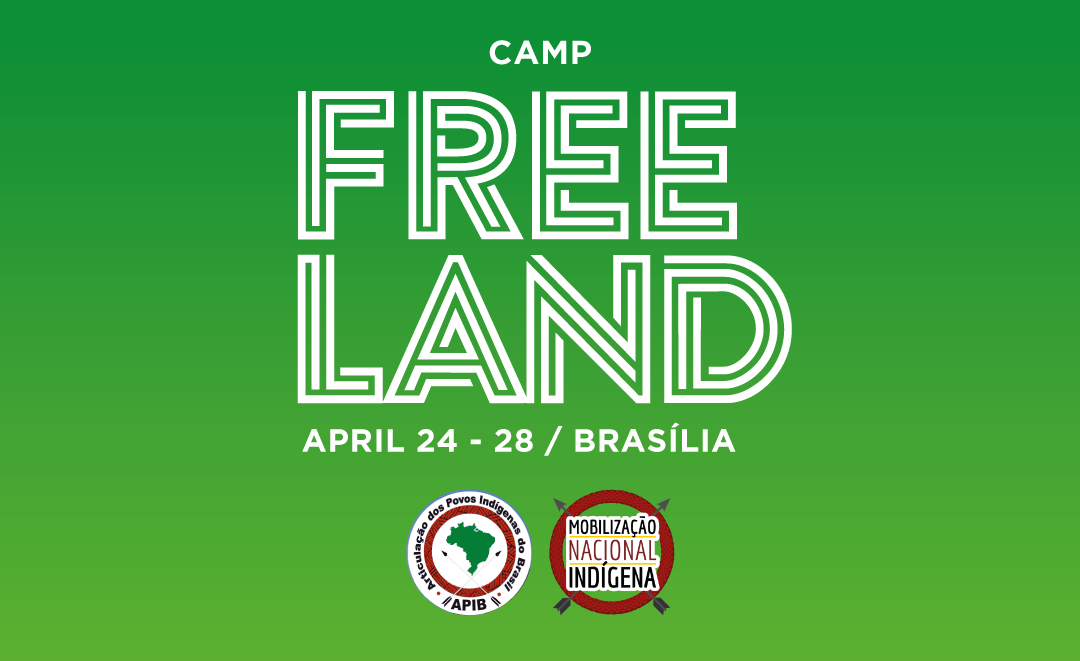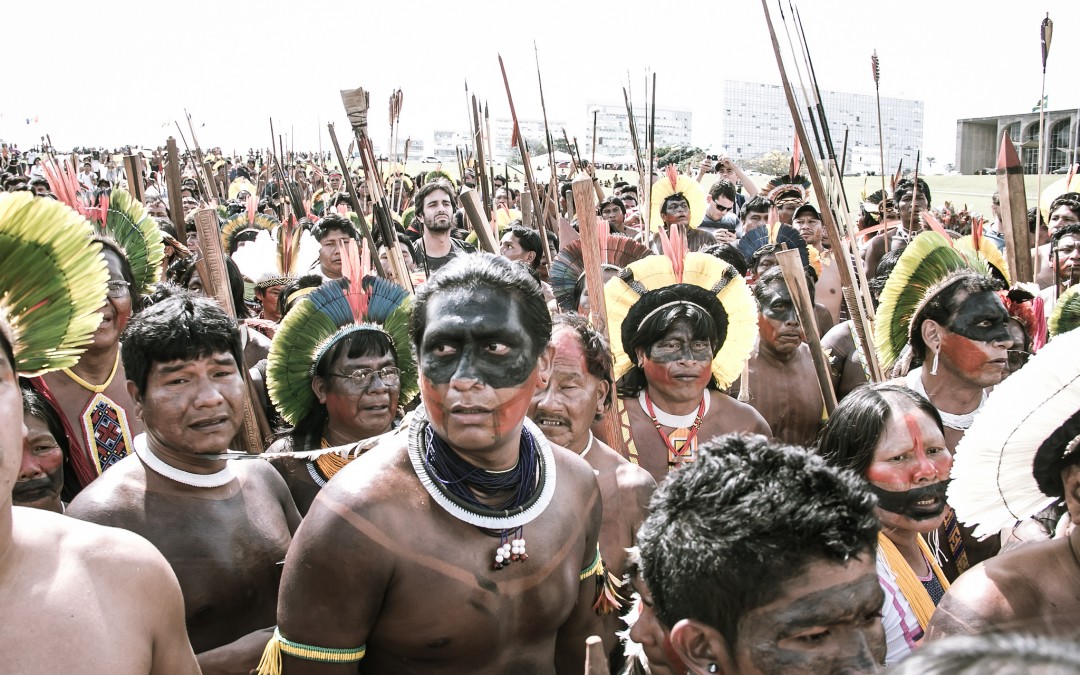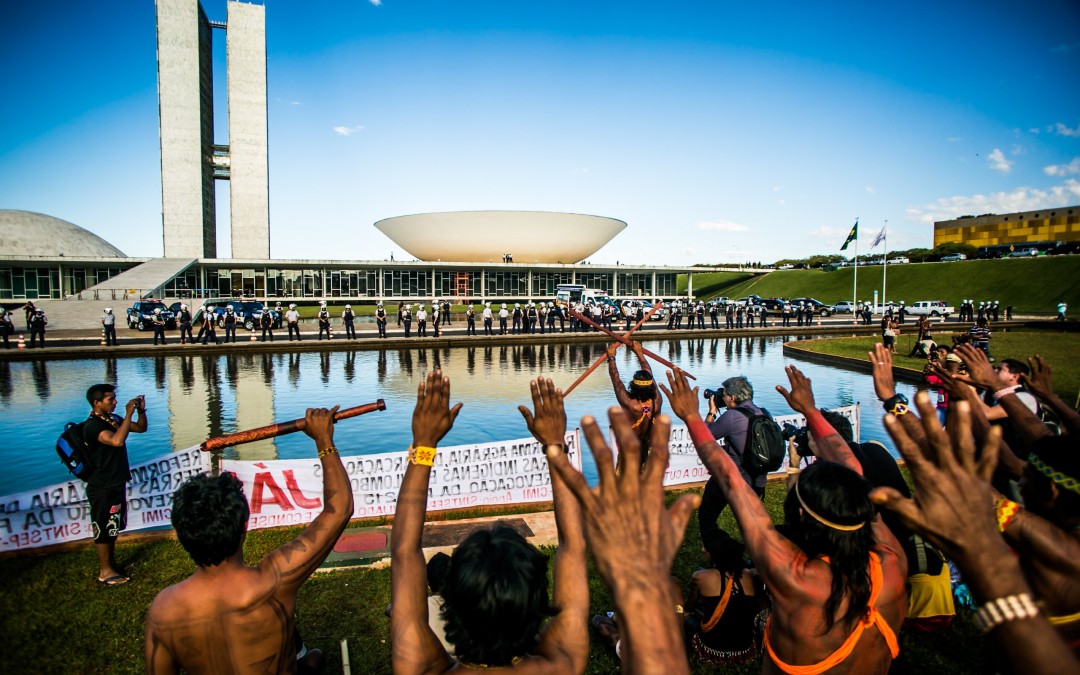
21/abr/2017
There are only a few days left for the beginning of the Free Land Camp 2017. The entire program aims to bring together in a large assembly leaders of indigenous peoples and organizations from all regions of Brazil to discuss and position themselves on the violation of the constitutional indigenous rights and the anti-indigenous policies of the brazilian State. Check out the complete grid:
April 24th
– Delegations arrival
– Reception Plenary
– Publication Launch (Unified Report): UN special Rapporteur to the indigenous people; Rapporteur about indigenous rights (Dhesca Platform) and parallel Report to the RPU.
– Surprise artistic presentation
April 25th
Morning:
– Opening Plenary
– Bureau on threats to indigenous rights in the three branches of government:
*Political Juncture
- Executive Power: Deconstructions of the institutions and public policies directed to the indigenous people (demarcation paralyzation, Dismantle of Funai and Sesai, decrees, etc.).
- Legislative Power: anti-indigenous legislation initiatives (Inquiry Parliamentary Commission – CPI; Law Projects – LP; Constitutional Amendment Proposals – CAP; Legislative Decree Projects – LDP).
- Judiciary System: Thesis of Time Frame, demarcation processes judicialized; Repossessions of Property; the Access to Justice rights denial; leaderships criminalization.
Afternoon:
March / National Congress Act
Night:
Indigenous Women Plenary
Cultural Activities
April 26th
Morning:
– Plenary: Themed Work Groups Guidance
* Indigenous Lands and territories (land situation, indigenous lands demarcation)
* Enterprises that impact indigenous territories (consultation right and free, previous and informed consent, consultation of community protocols).
* Time Frame; Right to access justice; indigenous communities and leaderships criminalization
* Indigenous Health / Indigenous Health Special Secretary (SESAI): background, current situation of the special policy and prospects.
* Indigenous school Education: pryors, current situation of the special policy and prospects, internal- and international (Law Projects – LP, Constitutional Amendment Proposals – CAP, International Treaties).
Afternoon:
– Plenary: Themed Groups results socialization
– Debate and referrals
– Public Hearing on HRC of Federal Congress
Night:
Free Land Audiovisual exhibit
Concert: Demarcation Now
April 27th
Morning:
– Plenary / Debate : “Unify the fights in defense of the indigenous Brazil”, with the presence of representatives from urban and countryside organizations and social movements.
– Plenary / Debate : “International articulation and unification of the indigenous peoples fights”, with the presence of APIB indigenous leaderships and international indigenous movements.
– FLC 2017 Memory
Afternoon:
– March and FLC Final Document protocol with the ministries.
– Hearings FLC Final Document protocols on STF Ministers chambers.
– Closure
Night:
Free Land Audiovisual exhibit
Special session: Martírio (2’50’’)
April 28th:
Indigenous movements taking part in the General Strike act with other social movements.
Complementary Activities:
- indigenous parliamentary, mayors and vice mayors Articulation meetings
- Indigenous communicators Articulation meetings
- Indigenous lawyers Articulation meetings
- Indigenous Women and Youth Articulation meetings
- Other Articulation meetings
- Exhibits: audiovisual, musical, cultural and artistic manifestations.
Obs.: The complementary activities should happen in different schedules of the plenaries, work groups, marches and manifestations, being preferentially on FLC nights.

02/abr/2017
FREE LAND CAMP 2017 CALL
Unify the fights and strengthen the indigenous Brazil.
For the guarantee of our people originary rights.
Context
The people and indigenous organizations of Brazil, after arduous fight journeys that involved historical formation processes, articulation, mobilization and tireless acting with the 88’s National Constitutional Assembly, with the support of congressmen, personalities and civil society institutions, achieved that the Magna Carta proclaimed on October 5th of the same year recognized on its 231 and 232 articles their right to have their own and differentiated cultural identity, such as their traditionally occupied lands originary rights.
During the years, the realization, namely, the materialization and respect to this rights became more and more distant. The political and economical forces that dominate the State progressively articulated themselves to reverse the achievements assured by the Federal Constitution; a framework that during the last 5 years have became worse, and with a major concern of Michel Temer’s illegitimate and anti-indigenous de facto government.
The indigenous rights suffer systematic attacks on distinct areas of the State: on the Executive Power, through several administrative, law and political measures that weakens and seek to dismantle institutions like the Indigenous National Foundation (Funai) and the public policies towards the indigenous people, implying on the stoppage of indigenous land demarcation, the precariousness of indigenous healthcare basic assistance, the stagnation of indigenous school education, the impracticability of the management, protection and sustainability of indigenous territories, among other setbacks.
On legislative power, hundreds of legislative initiatives – law projects, constitutional amendments, legislative decrees -, like PEC 215/00, seek to recede or suppress the fundamental, originary and permanent rights of the indigenous people assured by the 1988 Federal Constitution and backed by international legislation signed by Brazil.
On the judicial system, reinforces the slowness in judgements in detriment of the people, repossessions are fast in favor of invaders of indigenous lands, the criminalization of communities and leaderships has increased and there is a tendency to reinterpret the constitutional text by the so-called “timeframe thesis”, in other words, the understanding that is only traditional land those that were occupied by the people at the time of the Federal Constitution’s promulgation, disregarding the forced removal, the disseisin and expulsions suffered by the indigenous people.
It adds to these threats the return of the State tutelar vision, the denial of justice access rights, violence practices and institutional racism.
CALL
In face of this scary scenario that in reality threatens the existence and continuity of indigenous people, the Brazil’s Indigenous People Articulation (Apib) summons the peoples and indigenous organizations from all over the country to the biggest indigenous mobilization of the year – Free Land Camp (ATL) that will take place in Brasília – DF, on April 24 – 28, 2017.
The goal of the Camp is: “Reunite in a big Assembly leadership of the peoples and indigenous organizations from all the regions of Brazil to discuss and stand up against the violation of originary and constitutional rights of the indigenous people and the anti- indigenous policies of the Brazilian State.”
During the mobilization, which foresees to bring together 1.500 indigenous leaderships, it will be under discussion the deconstruction of public policies and institutions towards the indigenous people; the anti-indigenous legislative initiatives under evaluation at the National Congress; the Timeframe Thesis, the denial of the right to access justice and the leaderships criminalization. The Camp should take up a position about the stoppage of demarcations and the lack of protection of indigenous lands; the ventures that impact indigenous territories; the judicial system actions, the indigenous education and healthcare situation, the indigenist legislation; the indigenous youth and women issues, such as other matters of interests of the indigenous movement such as the parliamentary articulation, indigenous lawyers and communicators.
The Camping participants still should mobilize and protest together with public authorities and instances related with the protection and promotion of indigenous peoples’ rights and the implementation of public policies that concern them.
The APIB will make available the logistics, infrastructure and feeding conditions to receive the delegations, therefore belong to the indigenous associations, communities and organizations to seek out with their supporters and partners network transportation to go to Brasília. The participants can’t forget to bring their personal use things (toothpaste, soap, toothbrush, cutlery, mattress and coats) and, who can, lodging material (tents, canvas, blankets, sleeping bag, nets, musketeers, etc).
The delegations will be received starting from dinner on Monday, April 24th, on the Camping place that will be informed at another time. The mobilization activities will take place in 3 intense days, closing on the night of the 27th. Lastly, the delegations return to their original areas at the closure ending or on the next day, which is on April 28th.
For further information, please contact the Apib representation in Brasília, through the email [email protected] or by phone (61) 30345548.
Brazil’s Indigenous People Articulation – APIB
Indigenous National Mobilization




